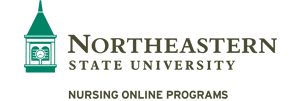Patients are a nurse’s top priority. When it comes to providing quality care, research shows that evidence-based practice (EBP) plays a crucial role. Earning a BSN is widely recognized as the way to build a strong foundation for EBP.
The RN to BSN online program at Northeastern State University (NSU), for example, builds on students’ previous education and experience to prepare them for professional nursing. This includes developing the skills and knowledge they need to integrate EBP.
What Is Evidence-Based Practice?
Evidence-based practice is a hot topic. That is because EBP is known to improve patient outcomes. RNs who implement EBP take a science-based approach to care, rather than relying on tradition, opinion or intuition alone. But EBP is about more than evidence.
The Institute of Medicine (IOM) — now the National Academy of Medicine — describes EBP as integrating three elements:
- Best research evidence
- Clinical expertise
- Patient values and preferences
What Is the History of EBP?
EBP is seen as a key to transforming healthcare, but it is not a new idea. Florence Nightingale may not have used the term EBP in the 1800s, but she is known for being an influential proponent of using data to inform care decisions. Her study of the causes of maternal mortality, published in 1871, is a notable example.
About a century later, Archibald Cochrane published Effectiveness and Efficiency: Random Reflections on Health Services. Cochrane was critical of the lack of reliable evidence in care decisions. He is known as the father of EBP.
More recently, the IOM identified EBP as a core competency for healthcare professionals, including RNs. A 1999 IOM report estimated that as many as 98,000 Americans were dying each year as a result of preventable medical errors.
Today, a Johns Hopkins study puts that number at 250,000 deaths every year, making medical error the third leading cause of death in the U.S. Evidence-based decision-making can help close the quality gap.
Why Does EBP Matter?
Clinical decision-making is part of everyday nursing practice. When those decisions are driven by the best evidence available, patients win.
Studies back up the benefits of EBP. Positive outcomes include:
- Increased patient safety
- Improved clinical outcomes
- Reduced healthcare costs
- Decreased variations in care delivery
Take ventilator-associated pneumonia (VAP), for example. VAP is one of the most common hospital-acquired infections. The Agency for Healthcare Research and Quality estimated a per-patient cost of VAP at $47,238. Adhering to evidence-based guidelines for reducing the risk of VAP can dramatically improve patient safety and outcomes.
Implementing EBP also benefits RNs. Equipped with the skills to provide care that is based on the best, most relevant evidence, RNs can remain assured that they are meeting their ethical obligation to provide “optimal care.” Getting on board with EBP can also promote career advancement.
How Can an RN to BSN Program Help Nurses Build EBP Skills?
Rapid advances in healthcare give RNs a lot to keep up with. Whether an RN has been providing care for a few years or several decades, there is always something new to learn. This includes the EBP process.
RN to BSN programs prepare RNs to implement an EBP approach to practice. In fact, a recent study showed that BSN graduates were significantly better prepared than associate degree RNs in 12 of 16 quality and safety competencies, including EBP.
Evidence-informed nursing practice is part of the Code of Ethics for Nursing. Earning a BSN equips RNs with the knowledge and skills they need to confidently embrace a science-based approach to improving the quality and safety of care.
Learn more about Northeastern State University’s online RN to BSN program.
Sources:
NCBI: Applying Evidence to Health Care Delivery
NCBI: Florence Nightingale (1820-1910): Maternal Mortality and the Training of Midwives
Institute of Medicine: To Err Is Human: Building a Safer Health System
Johns Hopkins Medicine: Study Suggests Medical Errors Now Third Leading Cause of Death in the U.S.
Centers for Disease Control: Guidelines for Preventing Healthcare-Associated Pneumonia, 2003
American Nurses Association: Code of Ethics for Nurses With Interpretive Statements


